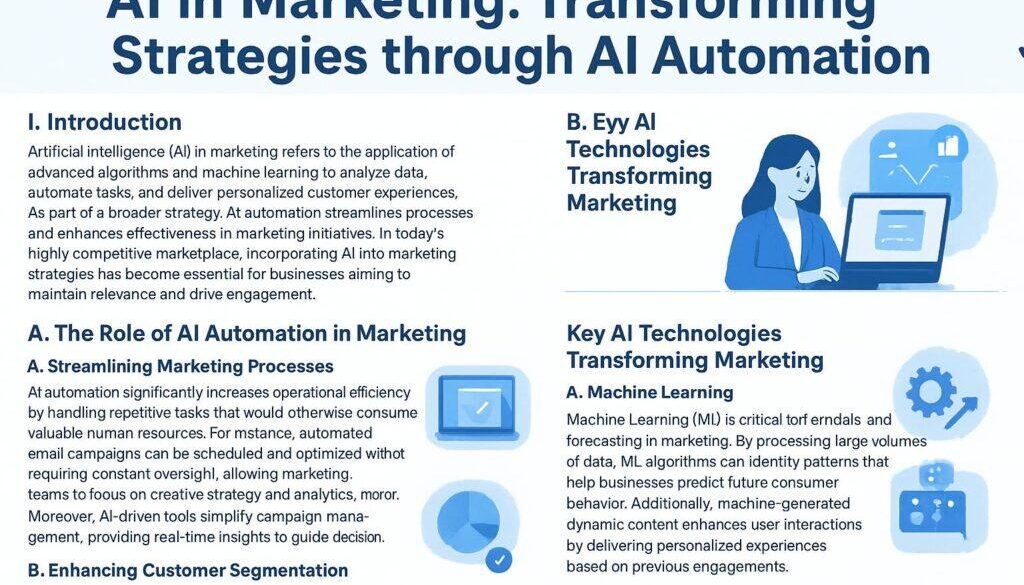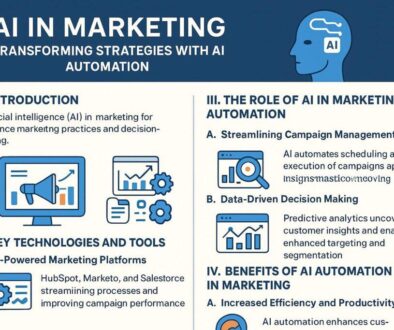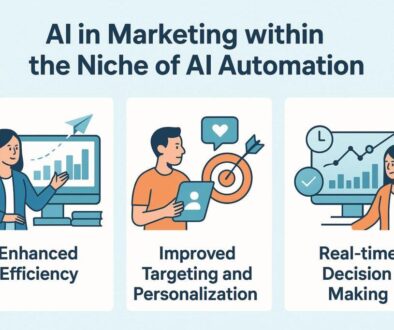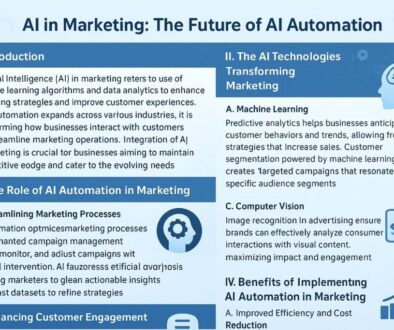AI in Marketing: How Automation is Revolutionizing Strategies and Enhancing Customer Engagement
AI in Marketing: Transforming Strategies through AI Automation
I. Introduction
Artificial Intelligence (AI) in marketing refers to the application of advanced algorithms and machine learning to analyze data, automate tasks, and deliver personalized customer experiences. As part of a broader strategy, AI automation streamlines processes and enhances effectiveness in marketing initiatives. In today's highly competitive marketplace, incorporating AI into marketing strategies has become essential for businesses aiming to maintain relevance and drive engagement.
II. The Role of AI Automation in Marketing
A. Streamlining Marketing Processes
AI automation significantly increases operational efficiency by handling repetitive tasks that would otherwise consume valuable human resources. For instance, automated email campaigns can be scheduled and optimized without requiring constant oversight, allowing marketing teams to focus on creative strategy and analytics. Moreover, AI-driven tools simplify campaign management, providing real-time insights to guide decision-making.
B. Enhancing Customer Segmentation
With AI, businesses can perform deep data analysis, enabling predictive modeling that accurately identifies customer segments. This leads to a more personalized approach in marketing efforts, tailoring messages and promotions to individual preferences and behaviors. By using advanced analytics, marketers can improve their targeting strategies, ultimately enhancing customer engagement and conversion rates.
III. Key AI Technologies Transforming Marketing
A. Machine Learning
Machine Learning (ML) is critical for trend analysis and forecasting in marketing. By processing large volumes of data, ML algorithms can identify patterns that help businesses predict future consumer behavior. Additionally, machine-generated dynamic content enhances user interactions by delivering personalized experiences based on previous engagements.
B. Natural Language Processing (NLP)
NLP is revolutionizing customer service through AI-driven chatbots that provide immediate assistance, improving customer satisfaction and loyalty. These tools can handle queries efficiently, allowing human agents to focus on more complex issues. Furthermore, sentiment analysis powered by NLP helps brands understand public perception, enabling them to adjust their strategies in real time.
C. Predictive Analytics
Predictive analytics allows businesses to anticipate consumer behavior through sophisticated algorithms that analyze past data. This capability helps marketers optimize pricing strategies and manage inventory more effectively, ensuring that offers are aligned with consumer demand. Consequently, companies can minimize wasted resources and maximize profitability.
IV. Benefits of AI Automation in Marketing
A. Improved Return on Investment (ROI)
By automating processes and enhancing targeting precision, businesses often see significant improvements in marketing ROI. Automation reduces costs associated with manual tasks and increases revenue by reaching the right audiences efficiently. This financial benefit proves compelling for companies looking to maximize their marketing budgets.
B. Enhanced Customer Experience
AI-driven personalization fosters a more tailored customer experience, which is critical in today’s digital landscape. Customers are more likely to engage with brands that understand their needs and preferences, leading to stronger customer loyalty. As a result, the overall brand perception improves, generating positive referrals and repeat business.
C. Greater Campaign Performance Metrics
The integration of AI tools equips marketers with enhanced analytics capabilities to measure campaign performance effectively. With access to real-time data, companies can adapt their strategies on the fly, optimizing their efforts and contributing to better overall results. This data-driven approach facilitates continuous improvement in marketing campaigns.
D. Scalability of Marketing Efforts
AI automation allows businesses to scale their marketing efforts without a proportional increase in resource expenditure. As companies grow, they can maintain a consistent level of outreach and engagement by leveraging automated solutions to manage larger audience segments. This scalability enables businesses to expand their reach and capitalize on emerging markets.
V. Challenges and Considerations
A. Data Privacy and Security Concerns
As businesses increasingly rely on AI for marketing, concerns around data privacy and security cannot be overlooked. Regulatory requirements such as GDPR necessitate that companies handle consumer data with diligence and transparency. Failure to comply can lead to significant reputational damage and financial penalties.
B. Dependence on Technology
Over-reliance on AI tools can stifle creativity and critical thinking among marketing teams. While automation enhances efficiency, businesses must ensure that they maintain a human touch in their marketing strategies. Balancing technology with human insight is essential for cultivating authentic customer relationships.
C. Integration with Existing Marketing Tools
Integrating AI automation with existing marketing technologies can present challenges, particularly if legacy systems are in place. Marketers must ensure that new tools and platforms can communicate seamlessly with established workflows to maximize effectiveness. This requires a strategic approach to technology adoption and ongoing support for staff.
VI. Case Studies
A. Successful Implementation Examples
Success stories abound with companies capitalizing on AI automation. For instance, Brand A leveraged AI to launch an email marketing campaign that segmented their audience based on behavior and preferences, resulting in a marked increase in open and conversion rates. Similarly, Brand B utilized predictive analytics for ad targeting, significantly enhancing their return on ad spend by reaching the most likely customers.
B. Lessons Learned from Failures
However, not all ventures into AI automation are successful. Some businesses have experienced setbacks due to poorly executed strategies or misalignment with customer expectations. Analyzing these failures is crucial for identifying risks and refining approaches to ensure future successes.
VII. Future Trends in AI and Marketing Automation
A. Evolution of AI Technologies
The future of AI in marketing is poised for rapid evolution, with advancements in areas like deep learning and neural networks potentially reshaping data analysis and customer targeting. As technologies evolve, marketers will need to continuously adapt their strategies to leverage these innovations effectively.
B. The Shifting Landscape of Consumer Expectations
Consumer expectations are shifting towards greater personalization and immediacy. As AI technologies advance, consumers will increasingly expect brands to provide tailored experiences that meet their needs in real time. Staying ahead of these evolving expectations will be crucial for maintaining competitive advantages.
C. The Rise of Hyper-Personalization
Hyper-personalization takes tailoring to the next level by utilizing AI to deliver highly specific content and offers based on individual customer journeys. This trend is set to redefine how brands interact with consumers, promoting deeper engagement and fostering long-term loyalty.
VIII. Conclusion
The impact of AI on marketing is profound, reshaping strategies and enabling businesses to operate with greater efficiency and effectiveness. Companies must embrace AI automation to stay competitive in an ever-evolving landscape. By adopting these innovative strategies, businesses can enhance their marketing efforts and prepare for a future driven by AI-powered insights.



